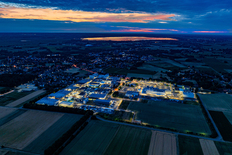- BASF's Lemförde site completed ISCC PLUS certification for biomass-balanced thermoplastic polyurethanes.
- Annual REDcert recertification was completed for thermoplastics and polyurethane systems.
- Elastollan® 1185 A10 FCI can be offered as ISCC PLUS certified for sensitive applications.
- ISCC PLUS and REDcert ensure correct renewable resource allocation in BASF's value chain.

Certification Achievements
BASF's production site in Lemförde, Germany, has successfully completed the International Sustainability and Carbon Certification (ISCC) PLUS program. This certification allows the site to produce biomass-balanced thermoplastic polyurethanes. Additionally, the site has achieved annual recertification according to REDcert for various thermoplastics and polyurethane systems. These certifications enable BASF to expand its sustainable product offerings and support customers in meeting their sustainability objectives.
Mass Balance Approach
The mass balance approach employed by BASF facilitates the replacement of fossil resources with renewable and recycled raw materials within its Verbund production setup. This method assigns renewable resources to specific products, resulting in a lower CO2 footprint without altering the formulation or quality of the end products. For instance, Elastollan® 1185 A10 FCI, used in sensitive applications like food contact or medical engineering, can now be offered as an ISCC PLUS certified variant.
Global Standards and Traceability
ISCC PLUS certification covers the entire value chain, ensuring that the certified share of fossil raw materials is replaced by renewable ones. This certification is internationally recognized for its mass balance methodology. Similarly, the European standard REDcert ensures the correct allocation of renewable resources in BASF's value chain. Both ISCC PLUS and REDcert confirm the proper allocation of sustainable biomass as a raw material in the chemical production system, based on independent audits.
Transparency and Sustainability
To claim the sustainability of a sales product, traceability of renewable or recycled raw materials must be demonstrated as part of the mass balance certification process. This step ensures complete transparency regarding high sustainability requirements across the entire value chain, benefiting both BASF and its customers.

